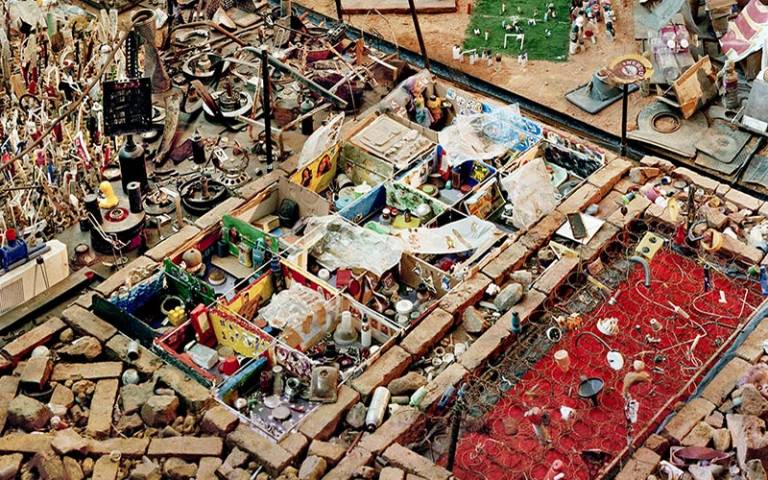Collaborative research theme launched with UCL Institute of Advanced Studies: Waste
10 June 2019
UCL Urban Laboratory and the Institute of Advanced Studies are pleased to announce a new collaboration during the 2019-20 academic year on the research theme of Waste

UCL Urban Laboratory and the IAS are committed to thinking across the arts, humanities and social sciences – and bringing engineering, planners, architects, hard science and the Medical School into the conversation with us. Our new collaborative theme of Waste is open to the widest possible interpretation and is assumed to address the concerns of many disciplines and departments while providing a frame for thinking across or even bypassing entrenched or established modes of thinking.
A call for events/research proposals related to the theme will be announced by the end of June 2019, so please keep an eye on our websites. It may be useful for prospective applicants to the call to know that the conversations we have been having around the theme have included the following concerns:
- Waste and space, waste of space – wastelands, waste dumps, no-go areas and washed out zones, land laid waste, disused space, space abandoned or unloved, uninhabited and uncultivated, overgrown or desolate, watery waste, space laid waste by damage/design, environmental/ecologies of waste/space, spatializing waste, land-fill and land left, leakages and spillages, poisoned landscapes and toxic fall out, weeds and wild growth, international politics of waste, transporting waste, geographies of consumption and rubbish
- Waste and cities – lifecycles of buildings and sites, atmospheric waste and pollution, waste management planning, waste and density, energy waste, waste and urban/building design, urban wastelands, demolition/destruction waste (e.g. through fire) and urban contamination/regeneration, waste and regeneration
- Waste and time – time wasting, spare time, squandering effort and energy, using up time, spoiling or spilling time, life-wasting, wasting away, degeneration and decay, the ravages of time, the uses of time
- Waste and money – useless expenditure, rampant consumption, squandering and seduction, throwing away, used up stuff, writing off, built in expendability, economies of waste, consumer culture, excess, extraneous commodities and surplus stuff
- Wasting of/from the body – decay, disease, wasting away, waste matter, secretions and emissions, bodily waste (blood, sweat, skin, excrement, snot, pus, urine) shedding and peeling, oozing and emitting, pouring and secreting, unsuccessful organ transplantation and tissue regeneration, recycling bodies – burying, incinerating and composting
- Waste and things – rubbish and rot, throwing out, throwing away, wear and tear, decay, left-overs, refuse, uselessness, by-products and binned goods, putrefaction, literal waste – garbage, excrement, detritus and trash, refuse matter; unserviceable material, remainders, useless by-products, unsaleable stuff, dangerous waste – pollution, carcinogenic and radioactive matter, poisoning – and its psychic and physic consequence
- Useful waste – repurposing, recycling, re-using, transformation, treatment and technology, repair and reuse, channelling waste – infrastructures of waste – sewage, excremental economies, lavs and loos, the architecture of waste – toilets, recycling plants, building materials and structures from left-overs and salvage, sustainability and harnessing energy and stuff, composting and composing from waste and muck, fermenting and rotting, circular economy and zero waste
- People and waste – societal dregs, those designated as rubbish or worthless, useless folks and expendable groups, the dirty and undesirable, the surplus and vilified, class and caste, labour and livelihoods, waste workers and garbage collectors, waste harvesters and contaminated/infected communities/folks, figurations of filth: rag pickers, street urchins, marginalised groups; unproductive labour, citizens and subjects
- Waste and behaviour – brain function and waste, habits of wastefulness, changing behaviour, managing waste, psychic excess, emotions and energies, dirt and desire, scatology, waste and education – consumption behaviour, mass media, information and propaganda, political correctness
- Waste and technology – obsolescence, malfunctioning, disused matter and materials, digital waste and trash – and its consumption of physical space, surplus and virtual expenditure and excess
Image: Vivan Sundaram, Prospect, 2008, Archival Pigment Print, 104.5 x 59.5 inches, ed 5/10 (detail)
 Close
Close


